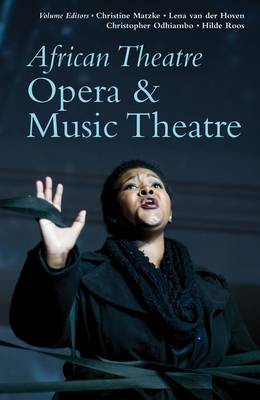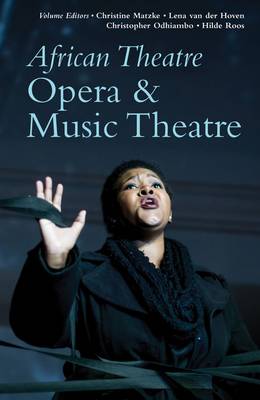
- Afhalen na 1 uur in een winkel met voorraad
- Gratis thuislevering in België vanaf € 30
- Ruim aanbod met 7 miljoen producten
- Afhalen na 1 uur in een winkel met voorraad
- Gratis thuislevering in België vanaf € 30
- Ruim aanbod met 7 miljoen producten
Zoeken
€ 177,45
+ 354 punten
Omschrijving
Music is often cited as a central artistic mode in African theatre and performance practices. However, little attention has been paid to music theatre on the continent in general, and to opera in particular, with the exceptions of a few noted genres, such as Concert Party or the Yorb "folk opera" of the 1960s, and the emerging research on opera culture in South Africa.
This volume of African Theatre highlights the diversity across the continent from a variety of perspectives - including those of genre, media, and historiography. Above all, it raises questions and encourages debate: What does "opera" mean in African and African diasporic contexts? What are its practices and legacies - colonial, postcolonial and decolonial; what is its relation to the intersectionalities of race and class? How do opera and music theatre reflect, change or obscure social, political and economic realities? How are they connected to educational and cultural institutions, and non-profit organisations? And why is opera contradictorily, at various times, perceived as both "grand" and "elitist, "folk" and "quotidian", "Eurocentric" and "indigenous"?
Contributors also address aesthetic transformation processes, the porousness of genre boundaries and the role of space and place, with examples ranging from Egypt to South Africa, from Uganda to West Africa and the USA.
The playscript in this volume is We Take Care of Our Own by Zainabu Jallo
GUEST EDITORS: Christine Matzke, Lena van der Hoven, Christopher Odhiambo & Hilde Roos
Series Editors: Yvette Hutchison, Reader, Department of Theatre & Performance Studies, University of Warwick; Chukwuma Okoye, Reader in African Theatre & Performance University of Ibadan; Jane Plastow, Professor of African Theatre, University of Leeds.
This volume of African Theatre highlights the diversity across the continent from a variety of perspectives - including those of genre, media, and historiography. Above all, it raises questions and encourages debate: What does "opera" mean in African and African diasporic contexts? What are its practices and legacies - colonial, postcolonial and decolonial; what is its relation to the intersectionalities of race and class? How do opera and music theatre reflect, change or obscure social, political and economic realities? How are they connected to educational and cultural institutions, and non-profit organisations? And why is opera contradictorily, at various times, perceived as both "grand" and "elitist, "folk" and "quotidian", "Eurocentric" and "indigenous"?
Contributors also address aesthetic transformation processes, the porousness of genre boundaries and the role of space and place, with examples ranging from Egypt to South Africa, from Uganda to West Africa and the USA.
The playscript in this volume is We Take Care of Our Own by Zainabu Jallo
GUEST EDITORS: Christine Matzke, Lena van der Hoven, Christopher Odhiambo & Hilde Roos
Series Editors: Yvette Hutchison, Reader, Department of Theatre & Performance Studies, University of Warwick; Chukwuma Okoye, Reader in African Theatre & Performance University of Ibadan; Jane Plastow, Professor of African Theatre, University of Leeds.
Specificaties
Betrokkenen
- Uitgeverij:
Inhoud
- Aantal bladzijden:
- 288
- Taal:
- Engels
- Reeks:
- Reeksnummer:
- nr. 19
Eigenschappen
- Productcode (EAN):
- 9781847012579
- Verschijningsdatum:
- 20/11/2020
- Uitvoering:
- Hardcover
- Formaat:
- Genaaid
- Afmetingen:
- 140 mm x 216 mm
- Gewicht:
- 480 g

Alleen bij Standaard Boekhandel
+ 354 punten op je klantenkaart van Standaard Boekhandel
Beoordelingen
We publiceren alleen reviews die voldoen aan de voorwaarden voor reviews. Bekijk onze voorwaarden voor reviews.







